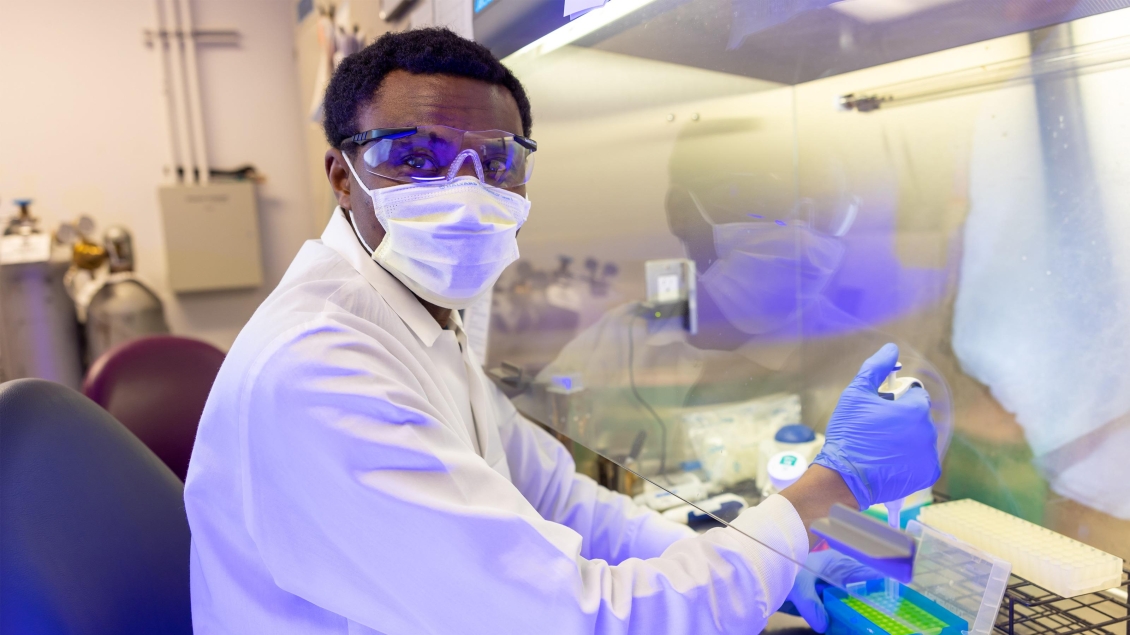
The University of Michigan Medical School Department of Microbiology and Immunology faculty participate in various multidisciplinary training programs of the Medical School. The following is a brief description of four of such training programs.
Molecular Mechanisms in Microbial Pathogenesis (MMMP) is an established and successful NIH T32 training grant-supported program at the University of Michigan Medical School. MMMP currently supports five predoctoral students and two postdoctoral fellows per year. Training takes place both in the laboratory with well-qualified and committed research mentors and within the larger Department in courses, seminars, journal clubs and career development activities. Students are typically nominated at the end of their first year of training, and have evidence of a strong interest in research into the roles of microbes in health and disease, along with the host response to infection. Coursework requirements for the program are aligned with those of the Department of Microbiology and Immunology. Postdoctoral fellows are also typically nominated during their first year.
All MMMP trainees participate in “Science in the Clinics,” the centerpiece of the MMMP curriculum. In this course, MMMP trainees explore infectious diseases from a translational perspective, learning to connect the basic research and training they are receiving with clinical and therapeutic features of infectious disease medicine. MMMP trainees also have the opportunity to host and visit extensively with invited guest Professors in the “Young Investigators” program, which brings investigators to campus for seminars on their research and meetings with trainees to discuss career path choices they were faced with as trainees themselves.
- Currently funds 5 predoctoral and 2 postdoctoral students per year
- Prospective trainees are typically nominated at the end of their first year in PIBS (predoctoral) or during their first year or postdoctoral training.
- Coursework for predoctoral students is aligned with Departmental requirements
- All trainees participate in Science in the Clinics, a course that explores infectious diseases from a translational perspective, connecting basic science to clinical and therapeutic aspects of pathogenesis.
- All trainees participate in the “Young Investigators” program, which brings junior investigators to campus for seminars on their research and meetings with trainees.
For more information, contact Vern Carruthers (Director) or Adam Lauring (Associate Director).
The Cellular Biotechnology Training Program (CBTP) at the University of Michigan is designed to provide students in a wide range of graduate departments an enhanced educational experience directed towards biotechnology. The Program, which is departmental based, provides students a background in basic cellular design principles and insights into rational engineering directed toward development of integrated bio-technological processes for optimum production of useful products.
This enhanced experience includes:
- monthly dinner meetings in which students from the associated departments discuss their research and discuss research with invited faculty;
- a one semester course in cellular biotechnology;
- a seminar series directed towards biotechnology with outstanding scientists from academia and industry;
- an opportunity to have a research experience in an industrial setting;
- a yearly symposium in which students and faculty have an opportunity through posters to discuss their research;
- contacts with scientists in the biotechnology industry. The study of how microbes cause disease encompasses a number of scientific disciplines.
For more information, please visit the CBTP website.
The central goal of the Cancer Biology Training Program is to train exceptional junior investigators at the predoctoral and postdoctoral levels to address fundamental Biological problems related to human cancer. This program is both multidisciplinary and interdepartmental, drawing its strength from the interdisciplinary cooperation of 37 faculty members from 14 basic science and clinical departments within the University of Michigan Medical School.
The Program draws further strength from its association with Rogel Cancer Center. The Program trains predoctoral and postdoctoral scholars with research opportunities focusing on four specific areas of basic research: Cancer Genetics and Virology, Cancer Cell Biology, Tumor Immunology, and Cancer Pharmacology. Predoctoral students comprise a subset of students already accepted into established graduate programs including Program in Biomedical Sciences. All trainees must have significant interest in pursing a career in some aspect of cancer-related research.
This interdepartmental training program is dovetailed into existing departmental and interdisciplinary training programs while providing a cohesive, high quality training experience in cancer biology. For more information, please visit the Cancer Biology Training Program website.
Genetics Training Program is interdisciplinary, with a faculty composed of members from the Departments of Biological Chemistry, Biology, Human Genetics, Microbiology/Immunology, and Pharmacology. Faculty members of the program have a common interest in the solution of genetic problems. Research areas include nucleic acid biochemistry; gene induced protein alterations; phage and animal virus genetics; control of genetic function in prokaryotic and eukaryotic cells; developmental genetics of yeast, Drosophila, and the mouse; plant genetics; immunogenetics; pharmacogenetics; cytogenetics; somatic-cell genetics; biometrics and population genetics; and human clinical genetics.
Trainees work toward a PhD degree in one of the five departments while completing the core requirements of the Genetics Training Program and must demonstrate competence in basic genetics as well as complete the degree requirements of the specific department to which they apply. The program is flexible in order to meet students' special interests; each student develops an individualized program with his or her advisory committee. The facilities of the 49 individual faculty members and the 5 departments involved include the space and equipment required for the completion of a successful training program. For more information, please visit the Genetics Training Program website.